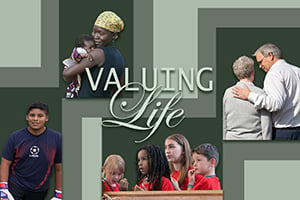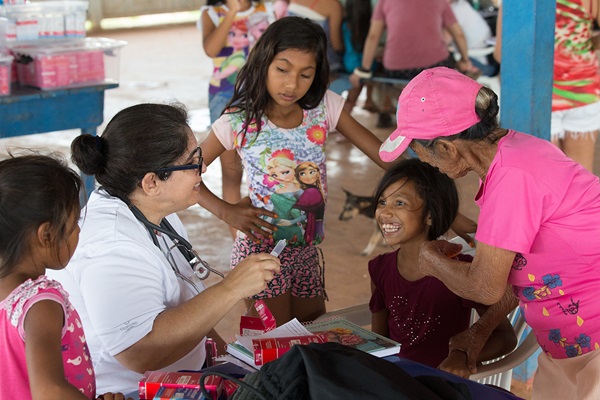Jesus said, “I came so that they could have life — indeed, so that they could live life to the fullest” (John 10:10, CEB). United Methodists value human life, from pregnancy and maternal care before we are born to our closing breaths.
God created all of us to thrive and be well. God’s vision for abundance creates conditions that allow all people to thrive and live out the fullness of their days.
Caring for children and their welfare is at the heart of enabling abundant living throughout our lifetimes. This includes but is not limited to ensuring "childcare... services available to all families on an equitable basis."
United Methodists, with all of our Methodist forebears, have always been and remain committed to the lives, safety, protection, health, and loving nurture of children in our congregations and throughout our communities, worldwide.
Wesley and Early Methodism
All United Methodist candidates for ordination answer the “historic questions” first asked by John Wesley of all who would serve as ‘helpers” in the early Methodist societies. In one of these, candidates promise to “visit from house to house.” This has always meant more than checking in on adults from time to time. When John Wesley visited from house to house, he also always spent particular time with any children in the house to ensure their physical, emotional, and spiritual welfare, one at a time, a practice of his mother, Susanna Wesley, with each of her children.
Selected United Methodist Child Welfare Projects
Alternative Rite of Passage (Kenya)
Children and Adolescent Education (Argentina)
Children, Poverty, and Violence (worldwide)
Girls Advocacy Program (Mozambique)
Health and Educational Development of Children (Bolivia)
Opportunity School for Mentally Challenged Children (India)
Street Children Ministry (Cambodia)
Wesley Preschools and Primary School (Tanzania)
Susanna’s individual time with each of her children could involve play, or preparing part of a meal, or reading scripture together. But it was always aimed at ensuring the each child knew their mother was watching out for each one, supporting their growth, and directing their interests toward healthy, life-giving ways.
John Wesley’s visits emulated that process, with a particular interest in learning how each child was growing in grace and in the use of the means of grace, according to each child’s capacity, then offering guidance to the parents to ensure their continued growth in grace.
All of this was counter to prevailing cultural norms about children in 18th century England, where, by and large, the interests of children and care for children were seen as of minimal importance. Children were to be seen, not heard, and they were simply expected to comply with what adults asked of them, not be supported in their growth toward responsible adulthood.
Children in 18th century England faced enormous death rates, forced labor, few and unaffordable educational opportunities, and widespread homelessness. Many of the homeless children had been abandoned at birth by mothers who could not care for them. Others formed roving gangs of untended orphans fending for themselves. Where orphanages existed, they were often grim "child storage institutions" providing mass shelter and meager care. Methodists created a new kind of orphanage as a place where children were raised with personal attention and care. Wesley himself started and often dined at a home for widows and orphans. And at Kingswood, he started the first of several Methodist schools to educate children whose families could not afford to educate their children.
Homes and Schools for Children and Orphans
Learn more

These early institutions set an example many Methodists would follow. Many annual conferences in the United States began their own homes for children, especially for orphaned children and children facing significant trauma or behavioral issues. While most conferences no longer directly fund or govern these homes, many conferences retain some sort of affiliation or connection to them. Look up the terms “Methodist Children Home” in any search engine, and you will find page after page of listings, most of them with historical ties with United Methodist annual conferences.
Worldwide, as a denomination (not including projects of annual conferences outside the US) United Methodists fund over 20 such projects, across 8 countries on three continents (Africa, South America, Southeast Asia) specifically focused on care and education for poor and orphaned children.
Safe Sanctuaries
Methodism’s care for children is not simply something we have paid for, but something every congregation is called to plan for, protect, and do. United Methodists have developed a rigorous and ever-adapting set of policies and procedures to be followed by every annual conference, every general agency, and every local church to ensure the safety and protection of children and vulnerable adults from physical, emotional, or sexual harm. Called Safe Sanctuaries, and launched by action of the 1996 General Conference, this process requires that every conference establish a contact person responsible to oversee and assist the implementation of the conference and denomination-wide recommended policies both within conference programming and in every local church throughout the conference. This process includes mandatory background checks for all persons who work with children and vulnerable adults as well as practical guidance for modifying both procedures and facilities to increase transparency and reduce possible exposure to abuse.
Advocacy
The General Board of Church and Society names “Women and Children” one of the major areas of advocacy and community organizing on which they work, worldwide. GBCS has been actively involved in opposing all policies of family separation in support of the denomination’s official position on immigration and the Indian Child Welfare Act. GBCS continues to involve two staff persons for advocacy and grassroots organizing at the denominational level. And at the annual conference level, GBCS works with the elected Church and Society leaders worldwide to advocate for the needs of children in their areas. United Methodists advocate for such diverse issues as adequate and affordable childcare and pre-K education, child safety in schools and in public, eliminating child marriage, female sexual mutilation and child soldiers, and ensuring full access to appropriate medical and mental health care for children.
From the streets of Bristol and London in 18th century England to the legislative bodies in the Democratic Republic of Congo and the United States, United Methodists and our predecessor denominations have consistently understood and acted for the welfare of the children in our churches and in our wider communities.
This content was produced by Ask The UMC, a ministry of United Methodist Communications.





